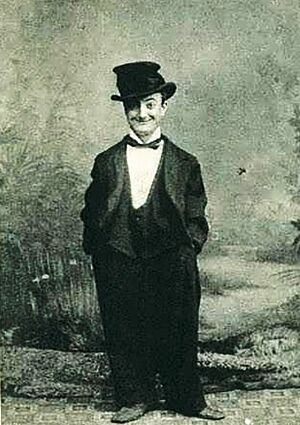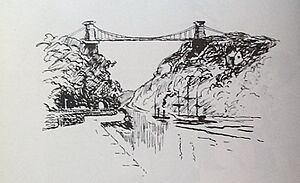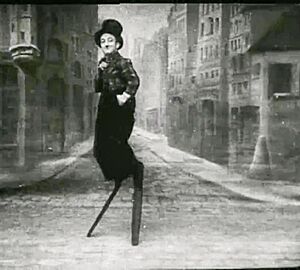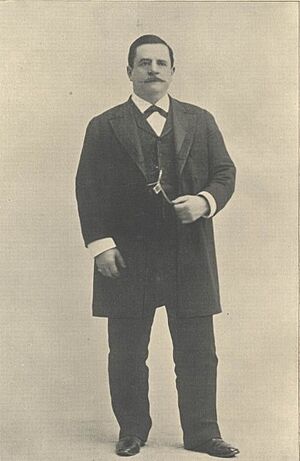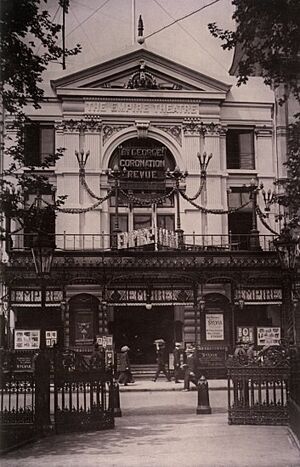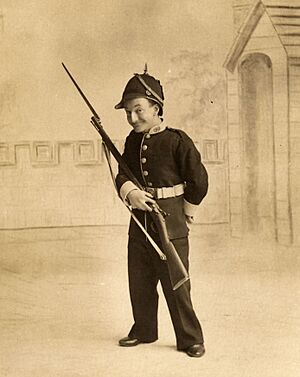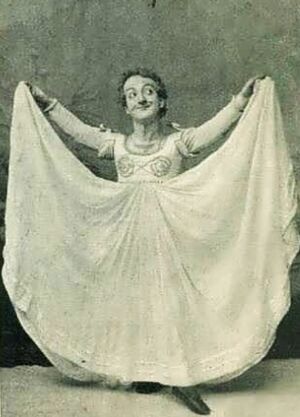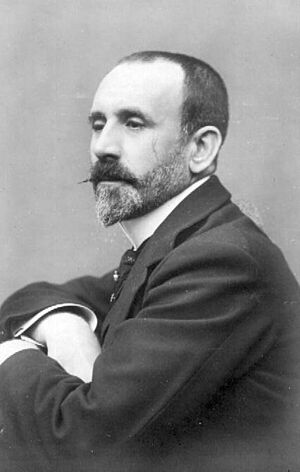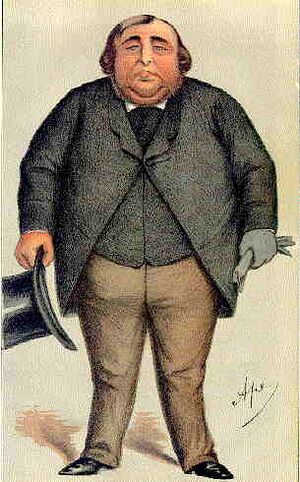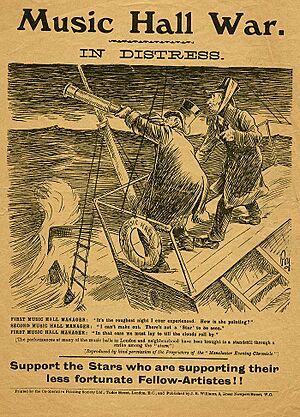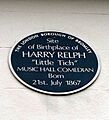Little Tich facts for kids
Harry Relph (born 21 July 1867 – died 10 February 1928), known professionally as Little Tich, was a famous English comedian and dancer. He was only about 137 cm (4 feet 6 inches) tall. He became very popular in music halls in the late 1800s and early 1900s. He was most famous for his funny and acrobatic "Big-Boot Dance." For this dance, he wore special boots with soles that were about 71 cm (28 inches) long! He performed this amazing dance all over Europe. Besides music halls, he was also a favorite in Christmas plays called pantomimes, appearing in them every year. He even performed in three big pantomimes at the famous Theatre Royal, Drury Lane in London between 1891 and 1893, alongside other stars like Dan Leno and Marie Lloyd.
Little Tich was born in Cudham, Kent. He started performing at age ten, doing a dance and playing the tin whistle in local pubs. In the early 1880s, he created a blackface act (a popular type of entertainment at the time) and became well-known. He performed at places like Rosherville Pleasure Gardens. In 1884, he moved to London and started using the stage name "Little Tich." This name came from his childhood nickname "Tichborne," because he was a bit chubby and looked like a famous person from a court case, Arthur Orton. The words "titchy" or "titch," meaning small, later came from his stage name.
Little Tich's act got even better during a tour of the United States from 1887 to 1889. There, he really developed his Big-Boot Dance. Audiences were amazed by how he could stand on the tips of his huge shoes and lean at incredible angles. In the 1890s, he created another dance called the Serpentine Dance. He also had a huge hit in the Christmas pantomime Babes in the Wood in Manchester in 1889–90. In 1891, a famous theatre manager named Augustus Harris hired him to appear in the big Drury Lane Christmas pantomime Humpty Dumpty. He then starred in two more shows there: Little Bo Peep (1892) and Robinson Crusoe (1893).
From 1896 to 1902, Little Tich had his own musical theatre company. He spent a lot of time in Paris, where he became a very popular variety artist. For his music hall acts, he created funny characters based on everyday people, like "The Gas Inspector," "The Spanish Señora," and "The Waiter." He even recorded twenty of these acts on old records. He was married three times and had two children. In 1927, he had a stroke, partly caused by an accidental blow to the head during a show. He never fully recovered and passed away the next year at his home in Hendon, at the age of 60.
Contents
Biography
Early Life and Family
Little Tich, whose real name was Harry Relph, was born in Cudham, Kent. He was the youngest of eight children. His father, Richard Relph, was a farmer and owned a pub, and his mother, Mary, was a nurse-maid. The Relph family was close and lived comfortably. His father was a good businessman and bought his first pub, the Rising Sun. Later, he moved to Cudham, bought the Blacksmith's Arms pub and a farm, and started a new family with Mary.
Harry was born with some physical differences: an extra finger on each hand and webbed fingers. He also stopped growing taller at a young age, reaching about 137 cm (4 feet 6 inches) by age ten. These differences made him feel a bit shy and lonely. However, they also made him unique and even helped his parents' business. People would travel from other areas to see him. Harry loved the attention and would dance comically in his father's pub for the curious guests.
Harry went to school in Knockholt. He was very smart and also good at art. By the time he was five, his father was selling his drawings to pub customers. Harry loved watching the traveling performers who often entertained guests at the inn. He would copy the dancers, singers, and magicians, which made his family and customers laugh a lot. His impersonations were so good that his brothers and sisters often took him to other pubs. There, he would perform for money. These experiences helped prepare Little Tich for his future career. He enjoyed being a local celebrity. However, as he got older, he sometimes worried that people were laughing at his differences, not just his funny acts.
Moving to Gravesend and First Shows
In 1875, Harry's family sold their pub and farm and moved to Gravesend. Harry, who was still a bit shy, had to get used to a much busier town filled with tourists and fishermen. He continued his schooling for three more years. In 1878, his headmaster thought he was too advanced for the school. He suggested Harry become a watchmaker, but his father didn't agree.
By 1878, Harry's parents couldn't support him financially anymore, so he got a full-time job as a lather boy in a barber's shop. One evening, he went to a music hall for the first time with a friend. He was instantly hooked on the idea of performing. Because he was already known as a "unique" person, he was welcomed into the many pubs that served soldiers and sailors.
By 1878, Harry had saved enough money to buy a tin whistle. He used it to play popular pantomime songs. To earn more money, he started busking (playing music in public) for theatre-goers waiting in line. On his way home, he would invent funny dances, which amused his neighbors. Little Tich made his first stage appearance as Harry Relph in 1879, at age 12. It was in a small, informal venue where most acts were amateurs. Audiences could be tough, sometimes throwing things if they didn't like a performance.
One night, when they ran out of acts, the host asked Little Tich to play his tin whistle. His performance was a success! He returned every night, often adding his funny dance routines. News of his performances spread, and he was soon hired by the nearby Royal Exchange music hall. They even bought him a pair of clogs. Little Tich became very popular there, sometimes singing thirty songs a night. It was at this hall that he learned about blackface, a popular type of entertainment in Britain at the time.
The 1880s: Becoming "Little Tich"
Early London Shows
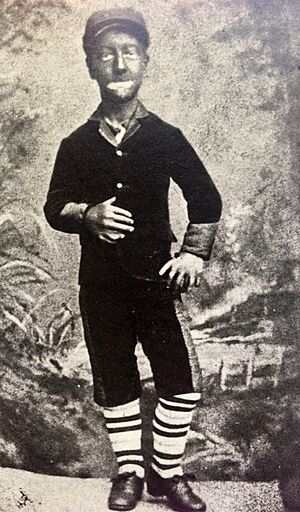
In the early 1880s, Little Tich started using the stage name "The Infant Mackney" and began performing in outdoor theatres. The next year, he joined a blackface group that performed at the Rosherville Pleasure Gardens. He became a professional performer when he got a regular spot at Barnard's Music Hall in Chatham, earning 35 shillings a week. Excited to be in a proper music hall, he changed his name again to Young Tichborne. He did well at first, but then audiences dropped, and his pay was cut. To make more money, he went back to working in the barber's shop and took other small jobs for six months.
In 1881, Little Tich left home with his sister Agnes, who traveled with him to music halls across England. By now, he used a picco pipe instead of a tin whistle for his clog dancing. He didn't like these early tours because he often had to sleep in cheap places with little money or food. To survive, he would often busk outside music halls. In early 1884, he got a job at a pub called The Dolphin in Kidderminster, earning £2 a week. He also hired his first agent, who, without Little Tich knowing, advertised him as a "freak" with "six fingers." The comedian was very angry and quickly fired the agent. When he had long periods without work, he used the time wisely. He learned to read and write music and taught himself to play the piano, fiddle, and cello. He also became very good at dancing in big boots.
In November 1884, he changed his stage name for the third time to Little Tich, which came from "Tichborne." The words "Tich" or "Tichy" became common terms for something small. He chose this name because the famous Tichborne Claimant, Arthur Orton, was touring Britain at the time. This name change also happened when he signed with a new agent, Edward Colley, who was well-known in London. Colley was excited about his new star and got him two shows: one at the Marylebone Music Hall and another at the Forester's Music Hall. A newspaper called The Era predicted that "We shall probably hear a great deal more about Little Titch, as he seems to be one of the few that can invest the business of the Negro comedian with any humour."
By Christmas 1884, Little Tich was performing regularly in four London music halls every night. He had the most success at the Marylebone, where he performed for ten weeks. A critic from The Era called him "a curious comic" and said his "antics, his sayings and his business generally [were] very amusing."
After a year of success in London, Little Tich went to Scotland to perform in pantomime for the first time during the 1885–86 Christmas season. He appeared in Robinson Crusoe in Glasgow. The next Christmas, he starred in another pantomime, Cinderella, in London.
Success in America
In 1886, an American theatre manager named Tony Pastor came to England and hired Little Tich for a tour of the United States. Pastor had seen him perform and was looking for talent for his Gaiety Theatre Company. Little Tich went to America in early 1887. His first role for Pastor was in a funny version of The Hunchback of Notre-Dame, where he played the main character for £10 a week. Later, during a successful show called La Esmeralda, he amazed audiences with his "Big-Boot Dance." Pastor then hired him for two more seasons of this show, which ran for nine months in total. To show his thanks for the huge profits, Pastor gave Little Tich a gold medal and a rare white dog.
Little Tich's success with Pastor caught the attention of the Chicago State Opera Company. They offered him a two-year contract for $150 a week. Before starting this contract, he returned to England to perform in the pantomime Dick Whittington in Brighton. In June 1888, Little Tich starred in The Crystal Slipper in Chicago, a funny show based on Cinderella. This show was a big hit and ran for over ten months. During The Crystal Slipper, Little Tich met an English dancer named Laurie Brooks, and they got married in America in January 1889. That year, Little Tich stopped performing in blackface. A producer told him that American audiences would find the black makeup and English accent too confusing. Little Tich was worried at first, but audiences liked the change.
As his tour continued, Little Tich improved his Big-Boot Dance. He switched from 25 cm (10 inch) boots to 71 cm (28 inch) boots, which suited his size better. He also learned to change into the boots very quickly. One time, a director thought the pause was too long, so he threw the boots onto the stage. Little Tich had to run back out and put them on in front of the audience, while the orchestra played music. This unplanned moment was very funny, and the audience loved it! He then made it a regular part of his Big-Boot Dance routine.
In April 1889, Little Tich briefly returned to London to perform at the Empire Theatre. However, audiences didn't like his act much, and his manager cut his pay. This experience made him feel bad about the English entertainment industry, so he went back to America. He starred in a new show called Bluebeard Junior, which toured for seven months. Despite his bad reviews in England, Little Tich started to miss home. He was allowed to return a few months before his contract ended. Once back, he and his wife settled in London. Their son, Paul, was born on 7 November 1889.
The 1890s: London and Europe
Return to London and West End Debut
In late 1889, Little Tich got a job at the London Pavilion. This time, English critics praised his talent, but he felt they were being hypocritical because they mostly talked about his success in America. News of his improved performances spread, and he was visited by Thomas W. Charles, manager of Manchester's Prince's Theatre. Charles offered Little Tich a main role in his upcoming pantomime Babes in the Wood. The show was a huge success for the comedian, and his performance reportedly received "the heartiest applause of the evening."
By early 1890, Augustus Harris, the powerful manager of the Theatre Royal, Drury Lane, had traveled to Manchester to find new talent. Impressed by Little Tich, he offered him a long-term contract at Drury Lane. Little Tich was already signed to Charles for another year, so Harris signed him for a two-year contract starting the next season. The deal meant Little Tich would star in two pantomimes for £36 a week. After his success in Babes in the Wood, Little Tich played Quasimodo in The Hunchback of Notre-Dame in Plymouth. In this show, he dressed as a ballerina and performed two of his early songs, "Smiles" and "I Could Do, Could Do, Could Do with a Bit."
In 1890, Little Tich continued to impress London music hall audiences. He appeared on the front covers of Entr'acte and Music Hall magazines. Towards the end of the year, he performed at the opening of the Tivoli Music Hall. He then returned to Manchester for Christmas to perform in his second pantomime for Thomas Charles, Little Bo-peep, where he played Toddlekins. The next year, he toured as Quasimodo again in The Hunchback of Notre-Dame.
Life at Drury Lane
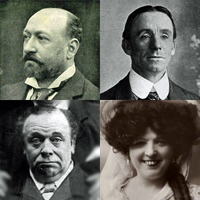
The year 1891 marked a new chapter for Little Tich. The Drury Lane pantomimes were known for being very grand, with amazing sets and big budgets. The first Drury Lane pantomime Little Tich appeared in was Humpty Dumpty in 1891. It also starred other Drury Lane favorites like Marie Lloyd, Dan Leno, and Herbert Campbell. Little Tich played the main role and a smaller part called the Yellow Dwarf. In this smaller role, he brought back his Big-Boot Dance, which was a huge hit with audiences. The next Christmas, he had similar success in his second pantomime, Little Bo-Peep, where he played "Hop of my Thumb." Harris was very happy with Little Tich and signed him for the 1893–94 pantomime Robinson Crusoe, where he played Man Friday. A newspaper called the Derby Daily Telegraph called him "one of the most amusing pantomime dames of all time." Even with a huge budget, Robinson Crusoe wasn't as successful as the previous two shows. This made Harris rethink his cast. Little Tich, not knowing Harris's plans, asked for a pay raise. This made the manager angry, and Little Tich was not only refused but also left out of any future shows.
New Shows and International Tours
In early 1891, Little Tich had a successful tour of Germany. Two years later, he created the character Miss Turpentine for his own dance sketch called The Serpentine Dance. He performed this act for the next three years in many European cities like Hamburg, Geneva, and Brussels. This tour also helped him become fluent in French, German, Italian, and Spanish. He played Miss Turpentine as a funny ballerina wearing a badly fitting tutu. The dance was a funny version of a popular skirt dance by Loie Fuller. Another successful character he created was an eccentric Spanish dancer. Like The Serpentine Dance, this act relied more on acrobatic moves and funny miming than on singing or telling jokes.
Around this time, Little Tich joined a group for entertainers called the Grand Order of Water Rats. In 1906, he would even become their "King Rat." In 1894, free from his Drury Lane contract, he took a three-year break from the English music hall scene and went to France for many shows. For the next ten years, he split his time between France and England. In early 1895, he moved from music halls to variety theatre, which many other performers were doing. His show Lord Tom Noddy opened in September 1896 and ran for two months in London. It wasn't a huge hit in the capital but was well-received in other parts of England. This show gave Little Tich a chance to show he could be a serious actor and move beyond being just the "deformed dwarf from the music hall." Audiences were described as "very large" with "frequent and loud" laughter.
He started his own theatre company in mid-1895 and produced his first show, Lord Tom Noddy, in which he also starred. He hired the writer George Dance to write the play and made him a partner in the company. On 11 December 1896, Little Tich was invited to perform at the Folies Bergère in France. He performed a short piece as Miss Turpentine and did the Big-Boot Dance. A journalist claimed that "no artist since Loie Fuller, four years earlier, had scored such a success." As a result, he signed a two-year contract at the Folies. Little Tich returned to England in late 1897. He produced his company's second show, a musical comedy called Billy. Even though the show had a good tour after opening in Newcastle, one reporter thought it "ha[d] not very much to recommend it." However, they thought Little Tich was "excellent fooling" and that it was "impossible not to laugh at some of the eccentricities." But the show didn't make it to the West End of London. Little Tich felt this was a rejection and refused to perform in London again. Instead, he went to South Shields for a short, successful play called Giddy Ostend before going back to France.
In 1898, he broke his contract with the Folies before it ended. He was hired by Joseph Oller to perform at the Olympia Music Hall in Paris. The Folies manager sued him, and Little Tich settled out of court. The theatre manager C.B. Cochran described him as "a reincarnation of the dwarf court-jesters of the Middle Ages." By now, Little Tich was frustrated with his English audiences. Since Billy didn't reach London and his success in England was less than in France, he stopped performing in English variety theatres in the late 1800s. He returned to the less popular music halls, where he stayed for the rest of his career.
The 1900s: Later Career and Family Life
Personal Life and Recordings
In September 1894, Little Tich and his wife Laurie set up their home in Paris. In 1897, while Little Tich was touring England, Germany, and Austria, Laurie left him and their young son, Paul. Little Tich sent Paul to live with relatives in England. That year, Little Tich met a dancer named Julia Recio while performing in Paris, and they started a relationship. They lived together in Paris, keeping their relationship quiet until Laurie Relph passed away in 1901. In 1900, Little Tich performed his Big-Boot Dance at a French theatre, and it was recorded on film. Years later, the filmmaker Jacques Tati called this film "a foundation for everything that has been realised in comedy on the screen."
In 1902, Little Tich starred in a special show with Marie Lloyd to celebrate the coronation of Edward VII. The next year, a newspaper called his performance at the Oxford Music Hall "a very droll turn" and his Big-Boot Dance "wonderful." Little Tich rented another flat in London to get away from Julia, as he found their life together becoming boring. Despite their problems, he married Julia in a quiet ceremony in London on 31 March 1904. Although they were happy at first, their marriage quickly got worse because they had different ideas about social life and money. Julia was outgoing and spent a lot, while Little Tich preferred a quieter, more careful lifestyle.
By 1906, Little Tich and Julia were so distant that she moved to a nearby flat, which he paid for. They never publicly announced their separation, and he continued to support her financially for the next twenty years. His son Paul later said, "Father and Julia never loved one another. Poor, poor father. His life was one long misery through her." For the next four years, Little Tich continued to perform in England and France, earning £10,000 a year. In 1905, he appeared in a French film called Le Raid Paris–Monte Carlo en deux heures, directed by Georges Méliès. He also appeared in two more films, Little Tich (1907) and Little Tich, the Tec (1909).
In 1907, Little Tich traveled to South Africa, where he had a successful nine-week show, earning £500 a week. Soon after, he returned to England to take part in the Music Hall War. This was when the Variety Artistes' Federation fought for more freedom and better working conditions for music hall performers. In 1909, he suffered a serious leg injury on stage in Belfast during a performance of the Serpentine Dance. A doctor in the audience diagnosed a dislocated knee, which forced him to rest for seven weeks. A reporter described his performance as "up to date" and said the Serpentine Dance was "next to the Big-Boot Dance in popularity."
Recording Career and New Family
In 1910, Little Tich adopted Rodolphe Knoepper, an orphan. Rodolphe's uncle had worked for Little Tich as his dresser. After his uncle's death, Rodolphe moved in with Little Tich in France and started school there. After a few months, he moved to London to stay with Julia. In later years, Little Tich's daughter Mary said her father treated Rodolphe more like a son than Paul, who became distant from the family by the 1920s. While in Paris in 1910, Little Tich was honored by the French government for his contributions to the stage.
Towards the end of 1910, he went to Scotland for a short show. A theatre reviewer called his performance "downright genuine fun" and "very entertaining." The next year, Little Tich recorded some of his music hall songs on old records. These included "The Gas Inspector," "King Ki-Ki," "The Toreador," and "The Zoo Keeper." Two years later, he recorded more songs like "The Waiter" and "The Weather."
In 1915, Little Tich cut short a show in London to take a better offer in Paris. Because of this, the theatre sued him, and he had to pay £103 in compensation. That year, he recorded more songs like "The Tallyman" and "The Gamekeeper." He then went to northern England to prepare for the Christmas pantomime at the Royal Court Theatre in Liverpool. There, he met Winifred Latimer (1892–1973), a singer and actress. Tich and Winifred were both starring in Sinbad the Sailor, with Little Tich in the main role and Winifred as the principal boy. They became close and started a relationship, even though her parents didn't approve. Sinbad the Sailor was a big success, and Winifred was praised for her performance, which she said was thanks to Little Tich's guidance.
In 1916, Winifred moved into a rented flat in Camden, chosen by Little Tich because it was close to his house. This made it easier for him to visit her without being recognized. In 1917, he recorded his last two songs, "Tally-Ho!" and "The Best Man." That year, Winifred became pregnant, which ended her stage career. This pleased Little Tich very much. However, Winifred was separated from her family and faced life as an unmarried mother with no career. On 23 February 1918, while Little Tich was performing in Brighton, she gave birth to a daughter named Mary. She and Mary then moved to a new home in Marylebone.
Last Years and Death
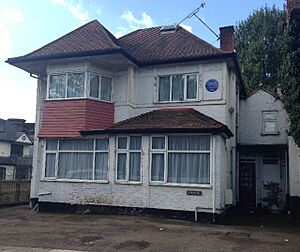
By 1920, relations between Little Tich and Winifred's parents had improved, and they welcomed him into the family. Even though he rented a new, six-room flat for his daughter and Winifred, Little Tich found it harder to support them and Julia on his earnings. His savings had greatly decreased. His annual income dropped significantly from £9,750 in 1921 and 1922 to £3,743 by 1923. In 1925, he earned £6,300, but this fell to just £2,100 the next year. Worried about the drop in pay, he reduced Julia's payments, which angered her family. Another money-saving plan was to stop renting properties in London and buy a small house instead. To avoid rumors about his relationship with Winifred, he stayed at his current home and bought a new house in Shirehall Park, Hendon, for Winifred and Mary in September 1925. Soon after, he went on a successful tour of Europe. He returned to London and performed at a Christmas show, where he did the Big-Boot Dance. This performance was becoming too tiring for the 58-year-old comedian, so he decided to retire it that year.
On the morning of 7 January 1926, Julia Relph passed away from a brain hemorrhage in the flat Little Tich had rented for her.
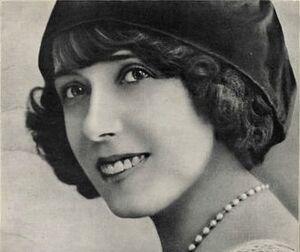
On 10 April 1926, Little Tich married Winifred quietly in Westminster. Later that evening, he performed at a theatre, while his new wife returned home. For their honeymoon, the family traveled to Bristol, where Little Tich performed with the French actress Mistinguett. She gave him a gold statue of himself wearing big boots. At the end of that year, the family visited Australia, where he toured Sydney theatres for £300 a week. He received a mixed reception from audiences there.
The following March, Little Tich and his family returned to England. He only performed once on stage that year, in November. He introduced a new song called "The Charlady at the House of Commons." For this character, he wore a ripped dress, a messy wig, and carried an old mop and bucket from home. The act required him to flip the mop into the air and catch the handle before continuing to sing. During one show at the Alhambra Theatre, the trick went wrong, and he was hit on the head by the mop. Despite the pain, he continued the act and refused medical treatment for the bump and headache.
One December morning in 1927, while getting ready for a family day out, Little Tich was talking to his wife, who was in another room. When he stopped responding, she became worried and found him slumped in a chair. He was taken to hospital, where doctors said he had a stroke. He lost his ability to speak and the feeling on the right side of his body. He was later discharged and returned home. A surgeon, Sir Alfred Fripp, visited him often and said that another condition, pernicious anemia, had also played a part in his seizure.
On the morning of 10 February 1928, Little Tich passed away at his home in Hendon, at age 60. He was buried at East Finchley Cemetery. His death and funeral were national news. The author and theatre critic Walter MacQueen-Pope predicted that Little Tich would be remembered for his unique physical traits and the word "tichy," meaning small. A reporter called him "the comedian whose popularity had never waned." In 1974, author Naomi Jacob thought that Little Tich would be remembered for many years, just like other famous performers.
Images for kids


